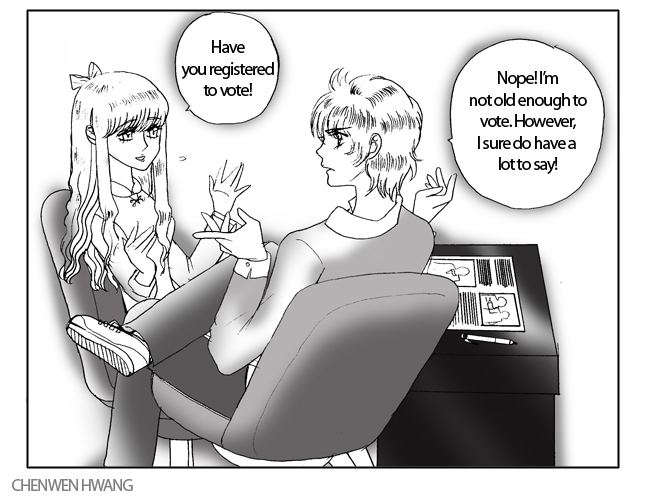
If controversy had a birthday, it would be in November. American voters experience an onslaught of opinions throughout October in preparation for November elections, from things like robo-calls, to yard signs. But the onslaught does not only affect voters. Teenagers and the country’s youth also lend their voice to the fray. Many students are not of age to vote, and whether that stifles their political voice depends on the student.
“I don’t care about government at all because I can’t vote. [My opinion] doesn’t make a difference,” says sophomore Jared Dilibero.
Junior Jacob Friedman, however, disagrees. “Even though it may not make much of a difference, it can only be beneficial to someone to know the issues that are affecting them and the people around them,” says Friedman.
While he considers many of his views to be liberal, he says “[I choose not to] associate myself with any political party”.
Friedman cites his father as one of his major influences when it comes to formulating his many opinions. But while his parents may have large influence on Friedman’s mindset, he specifies history as his greatest motivator. He sees modern politics as the North pitted against in the South in the American Civil War. Brothers are pitted against brothers, families and hearts are torn apart. Every November, the bloodbath of Antietam is replayed, although knives are replaced with newscasters, and guns are replaced with governors.
“I don’t really try to convince other people to my beliefs, but I’m happy to discuss them, and find out what other people’s thoughts and beliefs are,” says Friedman. While passionate when it comes to his politics, he has no agenda besides hope for our country’s well-being.
Freshman Arash Jalali-Sohi is another student who stays very up-to-date with public affairs. “[I am a] Democrat, because I don’t believe in the Republicans’ view of corporate taxbreak,” he says.
Jalali-Sohi remarks that while he gets much of his news online and via networks like CNN, his strongest influences are his parents.
“My parents are Democrats, but I think if they had raised me with Republican ideals, I’d most likely be a Republican today,” says Jalai-Sohi.
Some of the ideals his parents have nurtured into him are the importance of government and the necessity of fairness in a functioning society.
Jalai-Sohi’s strongest views arise in context of the war in Iraq. “[I believe] the Afghan and Iraq war should be our main concern, and we should figure out how to get out cleanly. The government is killing innocent civilians, and wasting taxpayer money. On top of it all, America is giving contracts to American companies to rebuild Iraq. [Money and oil were our real motives in invading Iraq].”
Jalai-Sohi speculates that this opinion, which he shares with his parents, might have been somewhat influenced by their shared Pakistani background.
Freshman Annika Ulrich is also strongly influenced by her parents and regards herself as a Republican. Ulrich says she discusses politics very actively with her mother, and it is rare that they disagree. One issue that they do disagree on is the highly controversial prop 19. Ulrich’s mother is very strongly opposed to the prop that would legalize the use of marijuana, while Ulrich herself is more on the “yes side” of the issue, although she still has conflicting ideas on its pros and cons.
Ulrich believes that the Republican Party is often negatively stereotyped in our highly liberal state. “I’m kind of Anti-Political Party, I think it really divides America. It leads to stereotypes of the people who support the party.” Ulrich cites George Washington’s Farewell address, during which he urged America not to form political parties and to stay united. He passionately declared our unity is what makes us strong, and that political parties would tear us apart.
While not all students can vote, many feel the need to voice their political opinions. Some opinions may be strong, others may be weak, but all help to diversify our student body.




